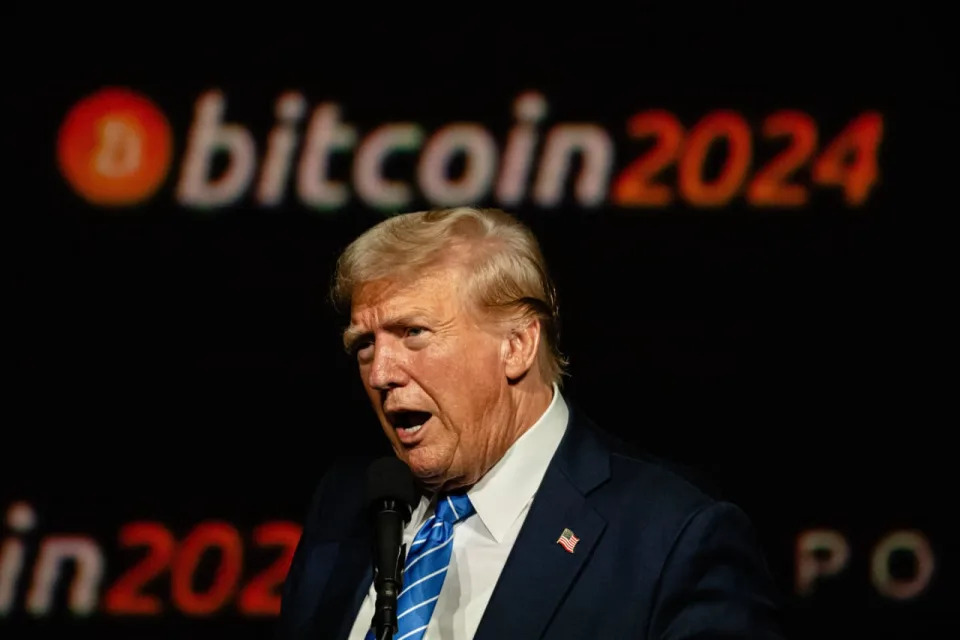
There is an apocryphal story of an investor, “Sam,” who became enamored of a lightly traded stock. He called his stockbroker and bought 100 shares at $20, made several more purchases that pushed the price up to $30, and made even more purchases that pushed the price up to $50. Then he told his broker to sell all his shares for $50. The broker replied, “Who to?”
We were reminded of this cautionary tale by reports that U.S. President-elect Donald Trump plans to establish a federal stockpile of bitcoin BTCUSD that will be used to pay off the U.S. national debt. If the federal government spends trillions on bitcoin, it will surely drive bitcoin’s price up. Indeed, the cryptocurrency’s price has already soared in anticipation of these purchases.
But how would the U.S. government buying bitcoin at inflated prices pay off America’s debt?
Real investments like bonds, stocks, and businesses yield income that benefit the owners even if their prices don’t rise. Bitcoin is not a real investment; buyers can only make a profit if they sell the bitcoin they foolishly purchased to a greater fool at a higher price than they paid. The federal government can foolishly spend trillions of dollars buying bitcoin at higher and higher prices. But is there a bigger fool than the federal government? Like hapless Sam, who will the government sell trillions of dollars of bitcoin to?
Perhaps Trump envisions a “pump-and-dump.” In a pump-and-dump scheme, a group of scammers circulate untruthful rumors about an investment, while trading at ever higher prices, luring in the credulous. After prices have been pumped up, the conspirators dump their holdings by selling to the suckers (a.k.a. “bag holders”).
Bitcoin markets have historically been plagued by market manipulation. A study published in the Journal of Finance concluded that almost all of the increase in bitcoin prices in 2017 was due to trading by one large, unidentified trader using another digital currency, called Tether, to buy bitcoin. In 2019 the Wall Street Journal reported that close to 95% of reported bitcoin trades were fake trades intended to manipulate prices. In a 2021 report, Research Affiliates, a widely respected investment management company, concluded that “perhaps [bitcoin] is just a bubble driven by a frenzy of retail, and some institutional, money eager to get a piece of the action. Alternatively, and far likelier in my opinion, is that this “bubble” is more fraud than frenzy.”
The federal government should be shutting down these shenanigans, not appearing to join the fraudsters with its own pump-and dump.
A more promising (and entirely legal) way of reducing the national debt is to prune some government bloat. Much has been written about the bloat in education. There is surely even more bloat in government.
Bloat is fueled by two factors: the uncertain value of most jobs and empire-building. In a simple business, say one where individuals make toys by hand, it may be possible to measure the value of a person’s labor. If someone makes one toy an hour, using $5 in materials, and the toy sells for $15, their toy-making labor is evidently worth $10 an hour.
For most jobs, however, it is exceedingly difficult to assess an individual’s contribution to the firm’s revenue. What is the dollar value of a member of a firm’s accounting department? Of a supervisor? Of a division head? Of the CEO? In a university, what is the dollar value of the work done by a groundskeeper, clerical worker, professor, dean of students, dean of faculty, or president?
In the federal government, few jobs beyond IRS auditors generate revenue and, unlike businesses and universities, spending is not constrained by revenue. It is almost impossible to measure the value of whatever it is government employees do. Is another congressional staffer, military recruit, clerical worker worth what they cost? There is no way of knowing.
What we do know is that managers everywhere like to build empires. The more people they hire and supervise, the more power, pay, and prestige they amass. Thus we have bloat — too many people doing too little: too many administrators, too many meetings, too many reports that no one reads. Bloat creeps into and overruns institutions — much like an insidious virus that enters and ravages our bodies.
Which brings us back to bitcoin. The Republican Party traditionally has emphasized the value of hard work for individuals and for society. They scoffed at the caricatured Keynesian idea that the government could spend its way out of recession by paying people to dig ditches and fill them back up again. Today, crypto does just that. The only difference is that people are paid to mine bitcoin, not dirt. Surely these miners have more useful things to do with their time.
As economist Paul Krugman once said: “ Productivity isn’t everything, but in the long run, it’s almost everything .” The real way to keep America great is to produce goods and services more efficiently, which will lead to a combination of lower prices, higher wages and larger profits.
Jeffrey Funk is a retired professor and winner of the NTT DoCoMo mobile science award. His latest book is “Unicorns, Hype and Bubbles: A guide to spotting, avoiding, and exploiting investment bubbles in tech” (Harriman House, 2024).
Gary Smith is a professor of economics at Pomona College and the author of more than 100 academic papers and 17 books, most recently (co-authored with Margaret Smith): “The Power of Modern Value Investing: Beyond Indexing, Algos, and Alpha,” (Palgrave Macmillan, 2024).
More: The AI bubble is looking worse than the dot-com bubble. The numbers prove it.
Also read: Bitcoin could top $125,000 or fall toward $77,000 this quarter — depending on what Trump does next





